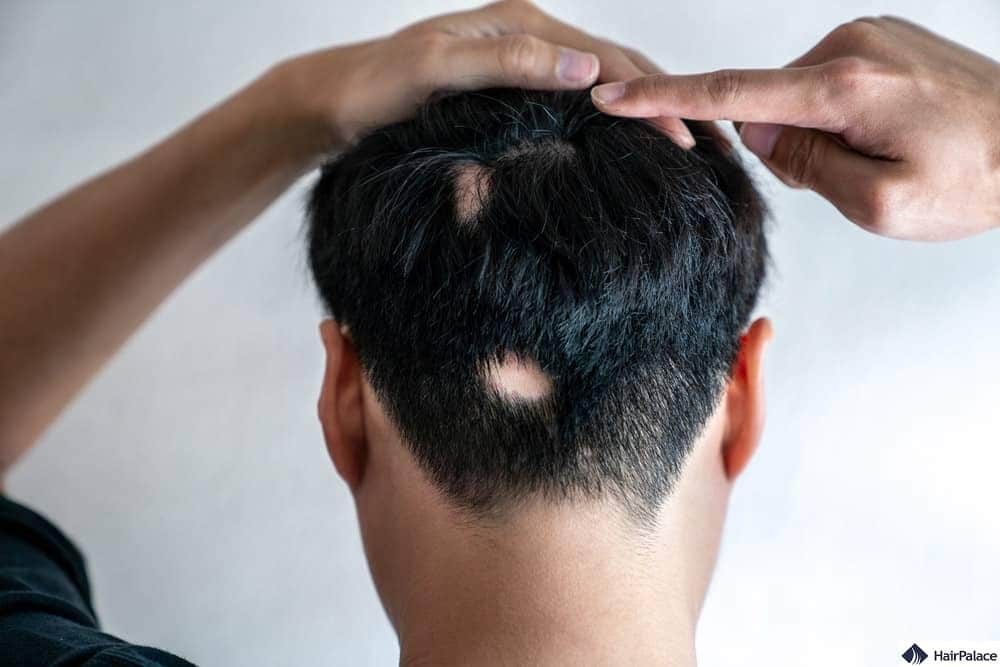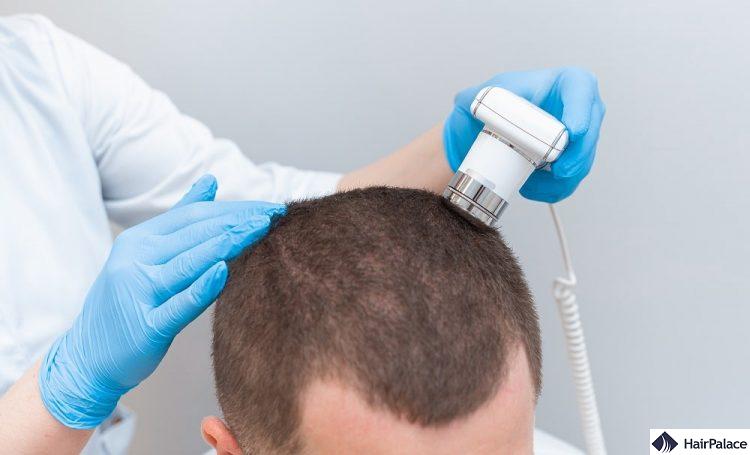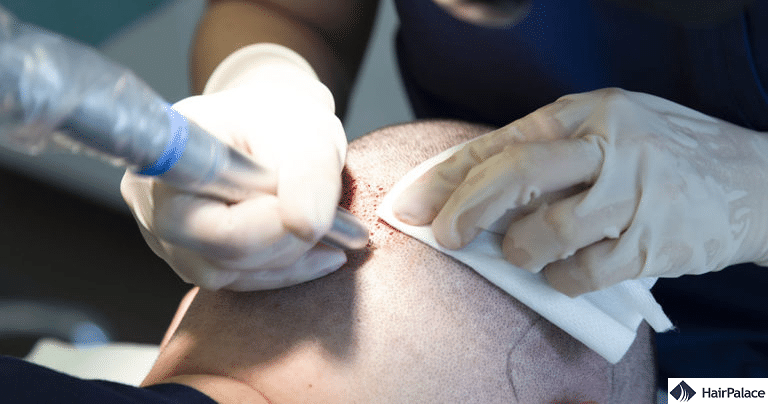Hair Loss: Causes & Treatments in 2025

Hair loss, or alopecia, is a condition where hair falls out from the scalp or other parts of the body.
It can be caused by various factors, including genetics, hormonal changes, medical conditions, medications, and stress.
Treatment depends on the underlying cause and may include medications, lifestyle changes, or surgical options like hair transplants.
In this comprehensive guide to hair loss, we’ll explore the causes, and treatments for hair loss, and give you expert advice for prevention.
What illnesses cause hair loss?
Various, complex issues can cause hair loss, so it’s best to visit a doctor or dermatologist if you believe you may be losing more hair than usual.
They will examine your scalp and discuss your medical history to try to identify a reason for your shedding, such as one of the following causes.
The most common reasons for hair falling out include:
1. Hereditary Hair Loss
Pattern baldness is the most common cause, inherited from one or more parents.
You will likely show signs of pattern hair loss if it runs in the family.
Specific sex hormones, such as DHT hormone, can trigger hereditary hair loss at any age — even during puberty.
2. Hormonal Fluctuations
Another potential catalyst for hair loss is hormonal changes, often due to:
- Becoming pregnant (hair loss early pregnancy)
- Giving birth
- Menopause
- Coming off the contraceptive pill
- Loss of hair due to thyroid
- Testosterone and hair loss
3. Medical Conditions and Medications
Alternatively, physically or emotionally traumatic situations, illnesses, and surgery can trigger balding too. In these cases, though, hair may start to regrow over time without the need for treatment.
The following medical conditions can trigger hair loss:
- Alopecia areata (causing the body’s immune system to attack follicles)
- Scalp infections and ringworm hair loss
- Thyroid disease
- Lichen planus, lupus, and other conditions that cause scarring
- Trichotillomania, otherwise known as hair-pulling disorder
- Frontal Fibrosing Alopecia

Medications may be responsible too, specifically those that treat:
- High blood pressure
- Depression
- Arthritis
- Heart problems
- Cancer
4. Shock and Lifestyle Causes
You may start losing more hair than usual if you suffer a severe emotional or physical shock. This could present itself in the following ways:
- Sudden death of a loved one
- An extremely high fever
- Weight loss and hair loss (Mounjaro, Wegovy)
- Anorexia hair loss
Other causes may not be due to medical conditions or treatments, including hair loss after surgery.
One possibility is traction hair loss, which could be to blame if you wear tight hairstyles putting intense pressure on the follicles.
Alternatively, you may start losing hair if your diet lacks essential nutrients like iron and protein.
Lastly, certain people go through seasonal hair loss which usually occurs in autumn.
How Do Experts Diagnose Hair Loss?
A doctor or dermatologist will diagnose your hair after an in-depth examination and discussion about your health background.
If you have shed a lot of hair without an obvious explanation (e.g. traction alopecia), you may have an underlying issue that needs to be resolved.
Your doctor or dermatologist may recommend something simple, such as changing your diet or prescribing a different medication.

How Can You Treat Your Hair Loss?
Various treatments for hair loss are available including:
- Minoxidil
- Finasteride
- Corticosteroids
- Hair transplantation
- Scalp reduction

How Can You Prevent Hair Loss?
You can prevent your hair loss from getting worse in various ways:
- Avoid tight hairstyles such as braids and ponytails
- Use a gentle shampoo
- Avoid heat styling tools
- Don’t perm, bleach or colour your hair

Can All Hair Loss Be Treated?
Some preventative measures and treatments for hair loss are more effective than others.
Medications may stimulate new growth in one patient but not another.
Eating more iron and protein could prevent hair loss from progressing further, or it may not.
However, the latest techniques can achieve incredible results: the FUE2 method has success rates of 90 – 95%, and new hair will grow back within 12 – 18 months after the treatment.
Hair Loss FAQ
Hair loss may occur due to a hereditary condition, medical issues, hormonal fluctuations, or as a natural part of the aging process. However, the most common cause is inherited hair loss combined with aging. While anyone may experience hair loss, it’s most common in males.
Hair loss is preventable in the majority of cases, but it’s vital that you take action as soon as possible for best results. If your hair starts to fall out or becomes thinner on one or more areas of the scalp, seek professional advice immediately.
Try the following tips to stop your hair loss from progressing further:
● Use heated styling tools less often.
● Avoid hairstyles that put prolonged strain on hair and follicles (e.g. tight ponytails).
● Wash your hair with a mild shampoo formulated for your hair type.
● Avoid bleaching or chemically treating your hair.
● Consider low-level light therapy, which may encourage hair growth.
● Brush with soft bristles, ideally made from a natural fibre.
We tend to shed between 50 and 100 hairs each day. You may notice your hair loss more if you have longer hair.
Iron deficiency can cause hair loss. This is because iron is crucial for producing hair cell protein, and without enough iron, hair growth can be affected.
Hair loss is the thinning or shedding of hair from the scalp or body, often caused by genetics, hormones, stress, or medical conditions.
Last medically reviewed on December 5th, 2025
- Williamson, D., Gonzalez, M. and Finlay, A. (2001), The effect of hair loss on quality of life. Journal of the European Academy of Dermatology and Venereology, 15: 137-139.https://doi.org/10.1046/j.1468-3083.2001.00229.x
- Ross EK, Shapiro J. Management of Hair Loss. Dermatologic Clinics 2005;23(2):227-243.https://doi.org/10.1016/j.det.2004.09.008.
- Phillips TG, Slomiany WP, Robert Allison II. Hair loss: common causes and treatment. American family physician. 2017 Sep 15;96(6):371-8.https://www.aafp.org/pubs/afp/issues/2017/0915/p371.html
- Mounsey A, Reed SW. Diagnosing and treating hair loss. American family physician. 2009 Aug 15;80(4):356-62.
- Gordon KA, Tosti A. Alopecia: evaluation and treatment. Clinical, cosmetic and investigational dermatology. 2011 Jul 19:101-6.https://doi.org/10.2147/CCID.S10182

